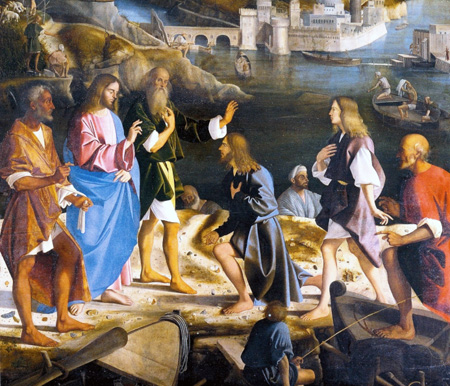Jesus called two of his first disciples, the fishing brothers James and John, “Boanerges” which supposedly means “Sons of Thunder”. Why is not sure, but it’s thought that they earned it with their impetuosity, zeal, and general loudness. We all know, or have, brothers like that.
Perhaps, along with “Rocky”, that is, Peter, they may have formed Jesus’ security squad. Who knows? He probably needed one not to be overwhelmed by lepers and cripples.
Anyway, it’s doubtless that they felt that they deserved a position close to the man anyway, as the boys asked if they could sit on either side of him in the Kingdom where his most trusted advisers would be stationed.
James and John, the sons of Zebedee, went to Jesus and told him, “Teacher, we want you to do for us whatever we will ask.”
He asked them, “What do you want me to do for you?”
They asked him, “Let us sit in your glory, one on your right and one on your left.” [Mark 10:35-37]
This happened right after Jesus openly told the disciples what was really going on:
“Behold, we are going up to Jerusalem. The Son of Man will be delivered to the chief priests and the scribes. They will condemn him to death, and will deliver him to the Gentiles. They will mock him, spit on him, scourge him, and kill him. On the third day he will rise again.” [Mark 10:33-34]
So were they trying to cash in, or was this trying to position themselves where they could better protect him? That it was likely the former is indicated by the version in Matthew, where it’s not the brothers who ask, it’s their mom!
Then the mother of the sons of Zebedee came to him with her sons, kneeling and asking a certain thing of him. He said to her, “What do you want?” She said to him, “Command that these, my two sons, may sit, one on your right hand and one on your left hand, in your Kingdom.”
She told him, “Promise that in your kingdom these two sons of mine will sit on your right and on your left.” [Matt. 20:20-21]
Seems like a pretty embarrassing situation either way, but Jesus deals with it most seriously:
But Jesus answered, “You don’t know what you are asking. Are you able to drink the cup that I am about to drink, and be baptized with the baptism that I am baptized with?”
They said to him, “We are able.”
He said to them, “You will indeed drink my cup, and be baptized with the baptism that I am baptized with; but to sit on my right hand and on my left hand is not mine to give, but it is for whom it has been prepared by my Father.”[Mark 10:38-40]
Seeing the brothers trying to weasel their way into Jesus’ glory sets off the jealousy of the other disciples. Most preachers skip right over Jesus’ discussion of the cup he is to drink and the baptism he is to have. I think the general assumption is that Christ is talking about his death still.
But this poses a problem. James (also known as “the Greater” to distinguish him from the other James in the Gospels, “the Lesser” who is an even greater problem being likely also “James the brother of the Lord”, but I digress…) anyway, James the Greater was indeed martyred, slain by the sword by order of King Herod Agrippa I [Acts 12:1-3]. His death, the first martyrdom among the Apostles since Judas’ suicide, which along with Peter’s arrest caused the first general flight of the Church from Jerusalem.
But John is a whole different story. John did get to sit close enough to the Lord to lean on him. Moreover, John was the only Apostle to stay with Christ all the way to the end while all the others ran. He was also the sole one of them who was not violently killed. Coincidence?
Instead, during the first decades, along with Peter and the other James, John ran the Church.
According to the traditions of the Early Church, John left Jerusalem and went to the pagan city of Ephesus. There, he was eventually arrested by Domitian, boiled in oil, but somehow survived and was packed off to the island of Patmos. While imprisoned, he supposedly wrote his famous Apocalypse and once he returned to Ephesus, he composed the Fourth Gospel which bears his name.
It is thought to be the last canonical Gospel that was written. Unlike the others as it has a decidedly spiritual orientation, it is the most like an actual eyewitness account. John is believed to have died naturally as a very old man during Trajan’s reign, around AD 100.
So did Jesus get it wrong about his death?
If John was indeed that Gospel’s author, “the beloved disciple”, the mystery deepens. For at the very end of John’s story, the very last thing Jesus says is about how long he would live:
Then Peter, turning around, saw a disciple following. This was the disciple whom Jesus loved, the one who had also leaned on Jesus’ breast at the supper and asked, “Lord, who is going to betray you?”
Peter seeing him, said to Jesus, “Lord, what about this man?”
Jesus said to him, “If I desire that he stay until I come, what is that to you? You follow me.”
This saying therefore went out among the brothers, that this disciple wouldn’t die. Yet Jesus didn’t say to him that he wouldn’t die, but, “If I desire that he stay until I come, what is that to you?” [John 21:20-23]
Since it is unthinkable that the Lord erred in discussing their fate, perhaps the cup and the baptism do not simply mean “bloody execution for the faith”.
The baptism that Jesus was baptized with, after all, was no ordinary dip in the creek – the Holy Spirit descended upon him in power and glory, totally transforming him. The cup, also, might not be the cup of misery of the Agony in the Garden that Christ wanted to push away, either. Perhaps the Last Supper was not the first Mass…
In any event, it is a strange situation. No doubt Peter asked about the beloved disciple’s lifespan because Jesus had just predicted Peter’s own martyrdom as an old man [John 21:18-19]. Did Jesus’ earlier comment make some believe John also would be killed, and sooner rather than later? Maybe John wrote that episode because he was likely the only Apostle left by the time he composed his Gospel and he wanted to prepare the young Church for his coming demise before the Lord came back.
In any case, Jesus’ response to Peter was that he had enough to worry about with his own life and death. Whatever fate befell John was not Peter’s concern.
Perhaps there is some hard wisdom here for these hard times.

